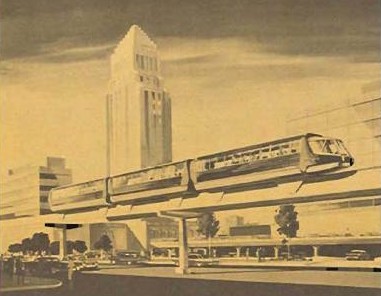 Photo:Tingwananpar/Flickr
Photo:Tingwananpar/FlickrAs the Los Angeles Department of Transportation prepares for five public hearings next month and in early March, activists are responding to their proposed series of cuts and fare hikes that will close the city's budget hole...at least when it comes to it's transit services. Unlike the reaction we saw two years ago when Metro outlined a series of major cuts to its bus service, transit advocacy groups are not nearly as unified in opposing these cuts as they were two years ago. For more information on LADOT's public outreach and other options to submit testimony, read the LADOT press release, available on Streetsblog here.
Each of the three major groups in Los Angeles, Southern California Transit Advocates, the Transit Coalition and the Bus Rider's Union each take a different approach.
Kymberleigh Richards' statement on behalf of the Southern California Transit Advocates crystallizes the difference in how advocates view the LADOT's bus service as compared to Metro. Remember that two years ago, Richards was one of the leaders opposing Metro's proposed cuts, even threatening the Metro Board with retaliation if they went through with their plans:
So.CA.TA is okay with a lot of this. The three Commuter Expresslines proposed for cancellation have very low ridership and displacedpassengers still have options. On the lines proposed formodifications, we believe 422 and 423 should continue to Thousand OaksTransit Center (a hub location) and that late night service on 142 shouldcontinue at less frequency...
...We're also okay with the proposed fare increases. although we think DASHfares should go directly to 50 cents (no interim step) as it has beenunrealistically low as a quarter for far too long. We do think theinteragency transfer (IAT) should be part of DASH's fare structure,though, especially to facilitate transferring to Metro where a DASH linehas been canceled or realigned to avoid route duplication. It maywell be that adding the IAT will be a condition of LADOT becoming an"eligible operator" for county sales tax subsidies anyway, sowe think they should just go ahead and do it.
Fellow So.CA.TA. executive Dana Gabbard also pointed to the need to cut waste in the DASH system.
Overall my impression is DASH is using the budget crisis as leverage toaddress some long overdue issues regarding glaringly poorly performingservices that politics made it impossible to touch heretofore. Can youthink of any other transit service where the timetables list the namesof the Mayor AND every council members whose district the route goesthrough? Plus every council member seems to have a pet new route thatthey constantly call for implementation even though LADOT has beentapped out of funding to do additional service for some years now, andhas warned before of impending deficits and a need to trim what italready runs.
Speaking for the Transit Coalition, executive director Bart Reed takes the middle ground between support and opposition and offers a third way. While not rejecting the idea that DASH needs some major changes to its operating structure, Reed offers the media-friendly line that the answer "is not the slash DASH!." He also pointed to the excellent series of articles on restructuring at Metro Rider written by our friend Wad, aka LA Wad, aka HercWad. Using Open Source data, Wad constructs his own, improved, DASH Service for Central L.A., the San Fernando Valley, and the East and Northeast.
While they haven't responded to my email requests for comment, staff for the Bus Rider's Union has made clear in previous conversations the disdain they hold for cutting bus service while expanding other city services such as the LAPD. Organizers have vowed to educate their members about the cuts and I expect a more public showing from them in the leadup to the hearings.





